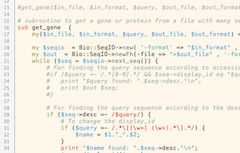Ageing Research Computational Tools
Version 0.9 (31/01/2005)
The Ageing Research Computational Tools (ARCT) is a toolkit of Perl modules aimed at bioinformatics, genomics, and gerontology, partly based on the BioPerl package. In a nutshell, ARCT allows you to:
- Generate phylogenetic profiles through local or NCBI's BLAST based on nucleotide or protein sequence. Statistical analyses of results are also included.
- Data-mine multiple sequences to find regulatory or functionally important regions.
- Analyse DNA sequences to find putative TFBS, CpG islands, etc.
- Display protein-protein interactions and phylogenetic trees, just like those available online in GenAge and AnAge.
- Interact with public databases to retrieve genes and proteins, as well as to quickly access sources of information such as PubMed and OMIM.
- Access other programs such as ClustalW and Gibbs for phylogenetic footprinting and data-mining.
Essentially, ARCT is a repository of modules written for the construction and data-mining of the databases and projects in the Human Ageing Genomic Resources. Our ultimate goal is to develop a toolkit that provides researchers with powerful, rapid, and automated tools to perform their research either locally or in a network. For the moment, however, please be aware that ARCT is not a stand-alone package and requires some expertize in Perl to prove useful.
The current version of ARCT is 0.9 (beta). Even though it is still under testing, this release is considered to be functional.
System Requirements
In order to run ARCT, you will need to have installed:
For some modules, you should require:
- TFBS 0.4.1 + PDL 2.4.0 (to use the TF.pm module)
- Gibbs (to use the Gibbs.pm module)
- ClustalW 1.8.3 (to use the Clustal.pm module)
- GD 2.06 (for graphical display of results) + associated files (i.e., libgd and libpng)
It is likely that ARCT also functions with earlier versions of some of the modules and programs mentioned above. Many of these Perl modules are also available through CPAN.
ARCT has been tested in Linux 2.4.x, though some modules remain functional under other operating systems.
Description of Modules
ARCT consists of eight Perl modules:
Clustal.pm to access ClustalW from within ARCT.
Gibbs.pm to access Gibbs from within ARCT.
Info.pm to build HTML files with links to various databases (e.g., PubMed, GenBank, RefSeq, MapViewer, OMIM, SwissProt, GeneCards, etc.).
Mining.pm for data-mining, including algorithms and statistical analysis tools.
Parser.pm to parse different files, access databases and generally glue the other modules together.
Profiles.pm to generate phylogenetic profiles based on DNA or protein data.
TF.pm to retrieve TFBS matrices, create a local TF matrix database, find putative TFBS, and display the results.
WWW.pm, which includes the subroutines for the graphical display of protein interactions, phylogeny, algorithm to find CpG islands and analyse sequences, etc.
Please take a moment to check the ReadMe, which includes installation instructions.
Example Scripts
main: included in ARCT is a general example script describing the functions and how to use them. We strongly encourage you to play a bit with this script before using ARCT.
What follows are some example scripts and corresponding output. Since ARCT can generate many types of output in different files, only a few of the output files are presented herein.
example1 generates as output the phylogenetic profile of the human DNA repair proteins using as threshold 60% query length and 40% residue similarity: profile.txt. It also generates a more detailed output that can be parsed using ARCT for other sorts of analysis: comparison.txt.
example2 gives as output a graphical display of the putative TFBS found, including TFBS clusters. In this case we have the WRN promoter WRN.png.
Disclaimer and Copyright
We are not responsible for any damage the use of ARCT may cause. Use at your own risk. Copyright © 2003 - 2005 by João Pedro de Magalhães. You may distribute ARCT according to the same conditions of the GNU public licence.

